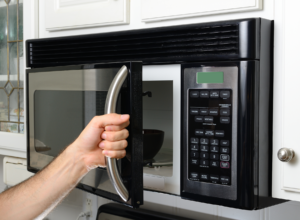Accidental Discoveries
January 24, 2025
To Inspire:

Most scientific discoveries take years of research and testing, but there are some well-known accidental discoveries that have made big impacts on our lives. The discovery of penicillin, credited as the beginning of modern medicine, happened when Alexander Fleming went on vacation and left a Petri dish uncovered. Vulcanized rubber came about when a bankrupt Charles Goodyear dropped some rubber on a hot stove. This week I learned that the microwave oven was one more accidental – and messy – discovery.
Though he dropped out of school at age 12, Percy Spencer was interested in electrical systems and taught himself chemistry, calculus, and radio systems while standing watch in the Navy. After he left the military, he ended up at defense contractor Raytheon.
During World War II, Raytheon was working on radar tools and Spencer was part of that team. They developed a cavity magnetron, a high-powered vacuum tube that generates microwaves. Spencer’s work on the magnetron improved radar technology so much he earned the Distinguished Public Service Award from the Navy. But that’s not his claim to fame.
One day while Spencer worked on the magnetron, he had a chocolate candy bar in his pocket. Exposed to the microwave rays from the magnetron, the chocolate melted. Curiosity aroused, Spencer sent out for un-popped popcorn, which popped in front of the magnetron and Spencer realized microwaves could cook food.
The first patent was filed in October 1945 and approved in early 1950. Raytheon began manufacturing the Radarange soon after. Of course, this 1950’s version of the microwave was six feet tall and weighed 750 pounds and was destined for industrial use. To help develop a household-sized version, Raytheon bought Amana Refrigeration in 1965 and released the first countertop microwave oven in 1967.
One big hurdle to consumer adoption of the microwave was fear of radiation. It wasn’t until 1971 that testing ensured microwaves did not emit dangerous levels and radiation and standards were set. I don’t remember the year my family first owned a microwave, but I clearly remember my mother telling me to stop standing close to it (watching the food go round and round) because she still thought it might be dangerous.
Microwave ovens certainly revolutionized food preparation, and it is estimated that today more than 90% of American homes have one. All because of an accident, and Percy Spencer having a mind open to new ideas and full of curiosity.
Creativity plays a crucial role in discoveries like this, by allowing scientists to recognize the potential significance of unexpected observations and then develop new ideas and theories. As Einstein said, “The important thing is not to stop questioning. Curiosity has its own reason for existence.” Curiosity isn’t just for acquiring knowledge, it reminds us that we’re alive. Challenge your creativity every chance you get, and don’t stop questioning – you never know what you might discover!

Written by Michelle O’Brien, Manager of Marketing & Communications
Source: Sicard, Sarah. How a Raytheon Scientist Accidentally Invented the Microwave Oven. Inc.com.